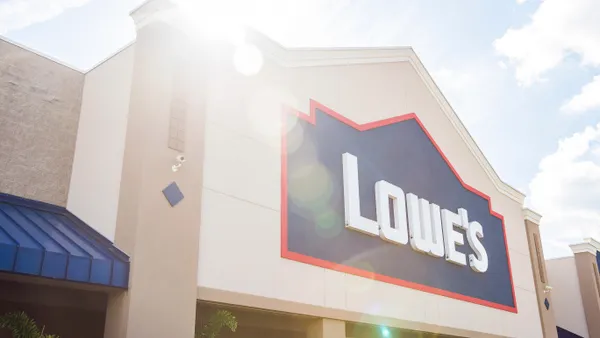Dive Brief:
- Walmart is partnering with HSBC to allow suppliers to apply for improved financing with the bank if they show progress under either Project Gigaton or the retailer's Sustainability Index Program.
- "In many industries it is a company’s supply chain — rather than the company itself — that is responsible for most of the environmental impact and therefore offers the greatest potential for sustainability improvements," Natalie Blyth, HSBC's global head of trade and receivables finance, said in a statement.
- Walmart's China-based suppliers have avoided 3.46 million metric tons of carbon dioxide as part of the Project Gigaton China, the retailer's effort to reduce emissions by 50 million metric tons by 2030, Walmart announced last week. This comes just over a year after the launch of Project Gigaton China.
Dive Insight:
"Embedding sustainability in global supply chains is not only beneficial for the environment and society, but also for companies’ bottom lines," Blyth said.
Climate change creates a risk for many large corporations as a changing environment can disrupt operations; 48% of suppliers include climate change within an integrated risk management process, The Carbon Disclosure Project (CDP) found in its 2019 supply chain questionnaire.
"If you have to buy less energy, you're saving money. If you're optimizing your routes, and using less gas and using less man-hours, you're saving money," Alexis Bateman, the director of sustainable supply chains at MIT's Center for Transportation and Logistics, told Supply Chain Dive earlier this year.
CDP also points to incentives, like the ones being offered by HSBC and Walmart, as ways for companies to encourage emissions reductions.
"Alongside the stick, purchasers can offer carrots: members of the CDP supply chain program recognize that supplier incentives, reward and recognition can go a long way to instill sustainable change," CDP said.
The number of companies looking to their supply chain to reduce emissions has grown in recent years. CDP noted it doubled in just a year, according to its 2017 Global Supply Chain Report. And focusing on these can make a big difference as these emissions are "around four times as high as those from direct operations," according to CDP.
There are 117 Walmart suppliers listed as "Giga-Gurus" on the retailer's website. These suppliers have set a specific and measurable emissions goal, shared the details of it publicly and reported avoiding emissions in the most recent reporting year. These include companies like Hormel Foods, 3M, Keurig, SC Johnson, General Mills, L'Oreal, Microsoft, Dole Food Company and Nestle.
But while the number of companies focused on supplier emissions is growing, it is still relatively uncommon. CDP said 35% of respondents reported emissions within supply chains, which means there is still a significant amount of buying power that can be used as leverage to make substantial changes in this area.
"This indicates that large portions of the global supply chain network are not considering climate in their decision making, which represents significant untapped opportunities and financial savings," Patricia Espinosa, the executive secretary of the United Nations Framework Convention on Climate Change, said in the 2017 CDP report.














